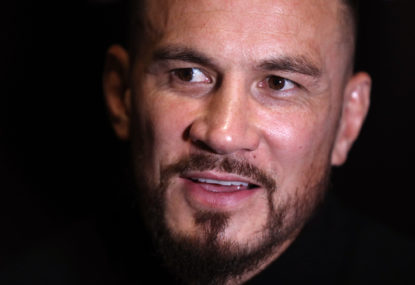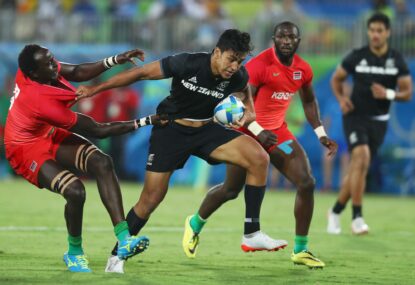If there’s one thing the first weekend of the Rugby World Cup has shown us, it’s that the bridge between the top eight teams and the rest of the world is closing.
Rewind just over four years ago, before France ’07 and there were calls to reduce the number of teams for future World Cups back to 16.
During that tournament, teams like Georgia, Tonga, the USA and Fiji reminded us that there are rugby-playing countries outside of the ‘Six Nations’ and Tri Nations competitions and such a move would be a backwards step.
Seven games into this tournament, the biggest blowout has been 31 points.
Romania, the USA and Argentina all got close to their much more fancied rivals and Japan, Namibia and Italy, all pushed France, Fiji and Australia respectively.
It’s made for an exciting beginning to the game’s showpiece event and ensures that rugby’s international future looks as bright as ever.
The responsibility of the IRB and their nations now is to ensure that this promising trend continues and future World Cups are tighter contests as the game continues to grow around the world.
These positive results are a side-effect of the game’s professional development with the rise of the domestic leagues in the ‘Six Nations’ and Tri Nations’ countries that allow opportunities for players from other countries to make rugby their full-time job.
Now more needs to be done to raise the profile of rugby globally and provide more opportunities for the full squads from the countries outside the top 10 to come together and compete against the developed rugby nations.
The first step that needs to be taken to accommodate this is to make the Tri Nations and Six Nations bi-annual events in even years.
This year’s Tri Nations was a joke, with the All Blacks and South Africa using B teams at different stages of the tournament. It takes away from what should be one of the benchmark regional rugby competitions.
Plain and simply these competitions shouldn’t run in World Cup years.
It also takes away some of the mystery when these teams meet in the tournament.
There should be a five-week window prior to the Cup for teams to play in friendlies to trial players and finish off their preparations.
It’s been acknowledged that the Tri Nations has become bland in recent years and the response has been to add Argentina to the tournament.
This isn’t the answer.
Argentina have no doubt come along in leaps and bounds, but there is no way they can compete with the top three nations in the world.
People point to Italy’s inclusion into the Six Nations but the Tri Nations doesn’t have a Wales or a Scotland that Argentina can compete with.
I’ll admit they are good enough to pull off the rare upset at home, but overall, having a new whipping boy in the Tri Nations does nothing for the competition and nothing for the game’s development in Argentina.
So to preserve some prestige and break the repetitive rugby calendar, the Tri Nations and Six Nations should go bi-annual.
What should happen in the odd, non World Cup years is a Hemisphere Cup in both the North and South.
To keep things interesting between World Cups in soccer at the international level, they have their continental tournaments.
To mix things up and include more countries apart from the big ten, we should use a similar model.
Here, in the south, we can have two groups of four involving the Tri Nations teams, the three island nations and a Namibia or Uruguay. The groups play each other once followed by the semi-finals and final.
Up north, they have enough countries for a competitive tournament of sixteen involving four groups of four. Apart from the Six Nations’ heavyweights, there are a number of European countries that are coming on strongly such as Georgia, Russia, Romania, Portugal and Spain.
The sleeping giants of the US, Canada and Japan can also be included. This makes fourteen teams and if such a tournament was to run tomorrow and you were to go off current rankings, Belgium and Morocco would make up the numbers.
After the group stage, the top two from each group advance to the quarter-finals, followed by the semi-finals and the final.
The countries outside of the Six and Tri Nations tournaments have done enough to show the world that they deserve to be able to call upon their strongest squads and be involved in top-class world rugby outside of the World Cup.
It is certainly the case in the southern hemisphere that our regional format running year-in-year-out is becoming dreary to the fans.
Shining the spotlight on these developing rugby nations more than just every four years is only going to help them continue their charge towards the rugby-haves.
Their top players get more time together and they get the chance to have a crack at the big boys that they otherwise wouldn’t get.
Although chances are they won’t win it in the short term, fans in these countries would get exposed to another big tournament that their country is involved.
This can only help popularity of the sport and continue grassroots development in these places.
It’s a big call to make, especially for the old boys club that run the game, but these administrators need to broaden rugby’s horizons.
The World Cup is showing us that the rest of the world is outgrowing the horizons that these administrators have set for them.
It’s time to take another step and start providing the countries outside of the traditional powerhouses the opportunities that they deserve.



































































































